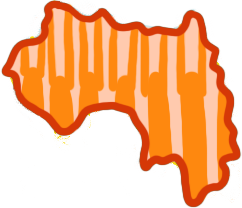Text
These Mindful Maninka chapters are primarily focused on grammar. This one is slightly different because its point of departure is vocabulary.
This is because there are a few words and expressions though that are essential if you want to start to be functional in the most basic way.
You need to know equivalents of the following English words and expressions so that you can at least muster a response in any situation:
- Yes
- No
- Ok
- Come again? — in case you need someone to repeat what they said
- I don't understand — for when you aren't sure how to answer
- Excuse me — so you can apologize for not understanding
After that, I'll introduce a few additional expressions that you'll likely either hear or want to use in a classroom setting!
"Yes"
I'm going to give you three ways of saying "yes". All forms are understood and used everywhere.
There isn't one standard written form that is dominant.
-
The first form is
ɔnhɔn.Go ahead and say it if you want:
ɔnhɔn. Thehin the middle is mostly a written convention, you don't really pronounce any breathy sound in the middle of the word.(In fact, in some N'ko writings, this version of "yes" is often written without any
hat all:ߐ߲߬ߐ߲߬ߐ߲߫ | ɔ̀nɔ̀nɔ́n) You may also see or hear this form "yes" with the vowels changed:anhan,unhun.Such variation is basically a question of personal preference. Use whichever one you hear your Maninka-speaking friends pronounce the most.
-
The second form is in some ways a vowel-less variation of the above:
nnn.It can be pronounced with or without an open mouth. What is important in pronouncing is the tone that you use. It should be a low to high pitch:
ǹǹń. (In fact, this intonation pattern is also a feature ofɔnhɔnabove). This form is absent from Latin-based writings, but you'll definitely hear it! -
The third form is slightly more Bambara-sounding, but you may encounter it too:
ɔwɔ.You may also hear it with an "a" sound at the beginning:
awɔ.
(NOTE: In N'ko texts there is also another form òowe, but it is absent in Latin writings.)
"No"
The other half of ɔnhɔn is of course, "no", and in this case you've got at least two options.
-
The first one is
ɔn-ɔn.You may also encounter it written without a dash (e.g.,
ɔnɔn). What's important when speaking is the tone; it goes from high-to-low:ɔ́nhɔ̀n. Note that this is the opposite of words for "yes", which are low-to-high (e.g.,ɔ̀nhɔ́n).In some cases, the vowel
ɔmay change:ɛn-ɛn. -
The second option which you may encounter, but that is more Bambara-sounding, is
ayi.
"Ok"
The next essential word is ayiwa.
It can generally can be translated as 'ok' or 'alright' and you can use it both to acknowledge something someone has said to you AND as a filler word when making transitions in conversation.
Go ahead and say it if you want: ayiwa.
You may also hear or see this in writing in a shorter form: awa. The fuller former is often considered to be more Bambara-sounding.
"Come again?"
For some English speakers, "Come again?" is a bit formal, but it's a simple way to translate an abbreviated expression that you can use if you aren't sure what someone has said and that is: ko di?
So if you hear someone say something and it sounds like ???? to you, you can ask them to repeat by saying ko di?
This expression is made up of two words that we can roughly translate for our purposes here as:
Ko+di?
say + how/what ?
If we fudge things a little bit then, we could almost think of this expression as being the same as the informal English expression, "Say what?" It's not that informal sounding by any means in Manding though so use it freely whenever you aren't sure what someone has said and you need it repeated.
"I don't understand"
Ok, so at this stage you often obviously aren't going to understand everything that people say. How can you acknowledge this instead of just inappropriately repeating ɔn-ɔn or ko di? over and over again?
You should memorize and use the expression N m'à faamun, which means 'I don't understand'. For now, you don't need to understand the grammar of the whole phrase, but here it is roughly translated:
N+ma+à+faamun
I + have.not + it + understood
So, more literally, this expression means something closer to 'I haven't understood', but it is generally used similarly to the way that we'd say "I don't understand" in English.
"Excuse me"
Alright, so you managed to say "yes", "no", "come again" before acknowledging that you haven't understood; how do you apologize? You can use the expression hakɛto, which contextually can be translated as, "Excuse me".
Literally it comes from an expression that means "Leave or let alone the sin":
hakɛ+to
sin + leave
But don't read too literally into it—you can think of it as simply a nice way to say "Excuse me".
► Student expressions
In addition to the above, there are few additional expressions that can be helpful when you are starting out as a new student of Maninka.
"I understand"
While you might often be lost, sometimes, you'll want to confirm that you do follow what is going on. In this case you can use: N bada à faamun.
Literally this translates as something close to 'I have understood it':
N+bada+à+faamun
I + have + it + understood
In terms of usage though, it lines up very closely with the English phrase, "I understand."
(NOTE: Remember that because of R and D variation, you may hear this as N bara à faamun
"I don't know"
Other times, you won't be lost, but you won't have the answer in your head. In this case you can say: N m'à lɔn.
It literally translates to something like 'I have not known it':
N+ma+à+lɔn
I + have.not + it + known
But it generally lines up with the English idea of "I don't know" (as in, "I understand, but I don't have the information necessary to respond")
"How do you say [...] ?"
When you aren't sure of how to say a particular English word in Maninka, it's always best to ask, well, in Maninka! To do so, you can say [...] ye fɔla di?
Literally, this expression translates to something like 'How is [...] said?':
[...]+ye+fɔla+di?
[...] + is + said + how ?
But you can generally think of it as equivalent to the English expression "How do you say [...] (in Maninka)?"
You can also optionally add maninkakan dɔ ('in Maninka') to the end of sentence if you want it to be more precise:
[...] ye fɔla di maninkakan dɔ?
'How is [...] said in Maninka?'
For instance:
–_"Morning" ye fɔla di (maninkakan dɔ)?_
– "Morning" ye fɔla ko 'sɔɔma' (maninkakan dɔ)– How does one say "morning" (in Maninka)?
– "Morning" is said 'sɔɔma' (in Maninka).
You may also hear people say ɲa di instead of just di for "how":
– "Hello" ye fɔla ɲa di maninkakan dɔ?
– How is "Hello" said in Maninka?
The expression ɲa di literally translates to "manner how". It can generally be used interchangeably with di ('how').
"What does [...] mean?"
If, on the other hand, you hear a Maninka word and you aren't sure of what it means, you can use [...] kɔdɔ ko di?
This expression translates literally to something like 'The meaning of [...] is said how?'
[...]+kɔdɔ+ko+di?
[...] + meaning + is/said + how ?
(NOTE: Remember that Ds and Rs often vary word internally, so kɔdɔ may also be pronounced with an R sound: kɔrɔ)
But you can use it as the equivalent of "What does [...] mean?" in English. For instance:
– "Sɔɔma" kɔdɔ ko di?
– "Sɔɔma" kɔdɔ ko 'morning.'– What is the meaning of "sɔɔma"?
– The meaning of "sɔɔma" is 'morning'
You may also hear the initial question with ye instead of ko:
– "Wura" kɔdɔ ye di?
– "Wura" kɔdɔ ko 'afternoon'.– What is the meaning of "wura"?
– The meaning of "wura" is 'afternoon'.
Don't worry about the details for now. You can view both X kɔdɔ ko di? and X kɔdɔ ye di? as interchangeable ways of saying "What is the meaning of X?"
► Teacher expressions
Finally, there's a few other useful expressions that you might hear in a Maninka classroom environment.
"Look/watch"
When the teacher wants to draw your attention to something so that you look at or watch something, you may hear the expression [...] fɛlɛ. For instance:
Nin fɛlɛ!
'Look at this!'
(or, 'Watch this!')
(NOTE: In Bambara and Jula, this takes form filɛ.)
"Listen"
If the teacher wants you to listen to something, you may hear the expression [...] lamɛn. For instance:
Dɔnkili lamɛn!
'Listen to the song!'
"Read it"
Should the teacher want you to read something, you'll likely hear [...] karan. For instance:
Kitabu karan!
'Read the book'
(NOTE: In Bambara and Jula, this takes the form kalan.)
"Say it"
When you need to say something out loud, you'll likely hear [...] fɔ. For instance:
À fɔ!
'Say it!'
"Repeat"
If you need to repeat or do something over again, the teacher may use the expression Sayin/seyin à kan (lit. 'Come back on it'). For instance:
Ko di? Sayin à kan.
'Come again? Repeat it.'
(NOTE: In Bamabara and Jula, this takes the form segin.)
"Precisely!"
When you answer correctly, you'll often hear a teacher confirm your answer as correct with the exclamation jaati, which we can translate as 'precisely' or 'exactly'.
"Good!"
And finally, when you've aced some activity or lesson, you'll likely hear something like O ka ɲi, which literally means 'That is good'.
Summary
To be a functional beginner speaker of Maninka before we go deeper into Manding grammar, it's helpful to not only master what we've already covered in Mindful Maninka, but also a few essential words and phrases that we've reviewed here:
| Maninka | English |
|---|---|
ɔnhɔn / ɔwɔ |
yes |
ɔn-ɔn / ayi |
no |
ayiwa / awa |
ok |
Ko di? |
Come again? |
Hakɛto |
Excuse me |
N m'à faamun |
I don't understand |
N bada à faamun |
I understand |
N m'à lɔn |
I don't know |
[...] ye fɔla di? |
How do you say [...]? |
[...] kɔdɔ ko/ye di? |
What does [...] mean? |
[...] fɛlɛ |
Look at / Watch [...] |
[...] lamɛn |
Listen to [...] |
[...] karan |
Read [...] |
[...] fɔ |
Say [...] |
Sayin à kan |
Repeat it |
Jaati |
Precisely |
O ka ɲi |
That's good |
Vocab
Coming soon n'Ala sɔnna!
- ɔnhɔn
- yes
- ɔwɔ/awɔ
- yes (Bambara style)
- ɔn-ɔn
- no
- ayi
- no (Bambara style)
- ayiwa / awa
- ok; alright
- Ko di?
- Come again?
- Hakɛto
- Excuse me
- N m'à faamun
- I don't understand
- N bada à faamun
- I understand
- N m'à lɔn
- I don't know
- X ye fɔla (ɲa) di?
- How do you say X?
- X kɔdɔ ko/ye di?
- What does X mean?
- ... maninkakan dɔ
- ... in Maninka
- ... tubabukan dɔ
- ... in French
- ... angilɛkan/anglais-kan dɔ
- ... in English
- Nin fɛlɛ!
- Look at / Watch this!
- Nin lamɛn!
- Listen to this!
- Nin karan!
- Read this!
- À fɔ!
- Say it!
- Sayin/seyin à kan!
- Repeat it!
- Jaati!
- Precisely!
- O ka ɲi!
- That's good!
Vocab list will be here someday!
Flashcards will be here someday!
Exercises
Exercises will be here someday!




